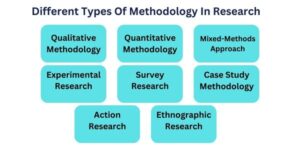5 Different Types of Research Methodology for 2024

Research Methodology refers to the systematic process used to conduct and analyze research. It involves a set of procedures and techniques employed to gather, organize, and interpret data. Various types of research methodology, such as qualitative and quantitative methods, form the foundation for investigating and understanding diverse phenomena.
Diverse research methodology provide a spectrum of advantages in scientific exploration. Qualitative methodologies, such as interviews and observations, delve deep into understanding human behavior and motivations. Quantitative approaches, like surveys and experiments, offer precise numerical data for statistical analysis. Mixed-methods enable a comprehensive view by merging qualitative and quantitative strengths. Experimental methods establish cause-and-effect relationships, while case studies offer in-depth insights into specific instances. Each methodology caters to different research needs, fostering a nuanced understanding of complex phenomena and contributing to the richness and depth of scholarly inquiry.
This blog is your guide to the Top 5 types of research methods that haven’t been fully tapped into yet. We’re talking about different ways to do research, the kind that hasn’t been widely used or discovered. It’s crucial to stay on top of these categories of research methodology because as the world moves forward, so does the way we study and understand things. So, we’ll be checking out the latest and coolest Research methodology types, from new technologies to fresh ways of combining different fields of study.
Different types of methodology in research

Research methodology encompasses a variety of approaches and techniques to gather and analyze data. Here are some Different types of methodology in research:
Qualitative Methodology:
In-depth exploration of attitudes, behaviors, and motivations.
Utilizes methods like interviews, focus groups, and content analysis.
Quantitative Methodology:
Focuses on numerical data and statistical analysis.
Involves surveys, experiments, and structured observations.
Mixed-Methods Approach:
Integrates both qualitative and quantitative methods.
Offers a thorough comprehension of the research problem.
Experimental Research:
Investigates cause-and-effect relationships.
Involves controlled experiments with manipulated variables.
Survey Research:
Gathers data from a selected group through structured questionnaires.
Examines trends, attitudes, and opinions.
Case Study Methodology:
In-depth analysis of a specific instance or case.
Offers detailed insights into complex phenomena.
Action Research:
Involves collaboration between researchers and practitioners.
Aims to solve real-world problems through iterative cycles of planning, acting, observing, and reflecting.
Ethnographic Research:
Immersive study of a specific group or culture.
Requires prolonged engagement and participant observation.
Methodology 1: Neurobiological Methodology
Neurobiological Methodology stands at the forefront of methodology in research paper, bridging the realms of neuroscience and traditional research methodologies. This is one of the Research methodology types which aims to unravel the intricacies of human cognition and behavior by integrating cutting-edge brain imaging techniques with established research methods.
Key Components:
Neuroimaging Technologies: Utilizes advanced technologies such as fMRI (functional Magnetic Resonance Imaging) and EEG (Electroencephalography) for all the research methodologies including exploratory research in research methodology. Enables real-time monitoring of brain activity, offering insights into cognitive processes during various tasks.
Biometric Data Integration: Incorporates biometric data, including heart rate variability and skin conductance, to supplement neurobiological findings. Provides a comprehensive understanding of emotional responses and physiological changes related to cognitive activities.
Experimental Designs with Neural Correlates: Designs experiments that correlate specific neural activities with behavioral responses. Allows researchers to identify neural markers associated with decision-making, memory, and learning.
Cross-Disciplinary Collaboration: Encourages collaboration between neuroscientists and researchers from diverse fields. Integrates expertise from psychology, sociology, and other disciplines to ensure a holistic approach.
Applications: Neurobiological Methodology, which is a descriptive methodology in research, holds immense potential across various research domains:
In Psychology: Unraveling the neural basis of psychological disorders, emotions, and cognitive functions.
In Marketing: Understanding consumer behavior by examining the neural responses to advertisements and product choices.
In Education: Enhancing learning methodologies by identifying neural patterns associated with effective teaching strategies.
Challenges and Future Directions: Despite its promises, Neurobiological Methodology faces challenges such as data complexity and ethical considerations. Future research should focus on refining methodologies, establishing ethical guidelines, and fostering interdisciplinary collaboration to unlock the full potential of this unexplored approach. Neurobiological Methodology emerges as a groundbreaking frontier, offering a novel lens through which researchers can delve into the intricacies of human cognition and behavior. As one of the different types of methodology in research, it holds the potential to reshape our understanding of the mind and pave the way for innovative solutions across diverse fields.
Methodology 2: Augmented Reality (AR) Research Methodology
Augmented Reality (AR) Research Methodology marks an unexplored frontier, intertwining cutting-edge AR technologies with traditional research methods. This is one of the types of methodology in research which seeks to create immersive environments for data collection, offering a unique perspective on human behavior and decision-making.
Key Components:
Constructs simulated environments using AR technology to observe and analyze real-time human behavior.
Enables researchers to study reactions and interactions in controlled yet dynamic settings.
Integrates AR-generated data collection points within physical spaces.
Facilitates the gathering of diverse data sets by embedding virtual elements in real-world contexts.
Utilizes AR interfaces to track user interactions and responses.
Enhances the understanding of user engagement and decision-making processes within augmented scenarios.
Combines AR experiences with traditional research methods such as exploratory research in research methodology for a comprehensive approach.
Allows researchers to triangulate findings by comparing results obtained from both virtual and non-virtual settings.
Applications: AR Research Methodology, which is also a descriptive methodology in research, holds promise across various research domains:
Simulating scenarios to observe human responses to environmental changes in descriptive qualitative research methodology.
Analyzing consumer behavior within augmented retail environments for product placement and advertising strategies.
Creating interactive learning experiences to study the impact of AR on knowledge retention.
Challenges and Future Directions: Challenges such as technological constraints and the need for standardized protocols highlight the evolving nature of this Research methodology types. Future endeavors should focus on refining AR applications, establishing ethical guidelines, and exploring collaborative opportunities with AR developers. Augmented Reality Research Methodology stands as an exciting avenue among the types of methodology in research, offering a transformative approach to understanding human behavior within virtual and augmented spaces. As technology continues to advance, this methodology holds the potential to redefine the landscape of research methodologies across diverse disciplines.
Methodology 3: Predictive Analytics in Social Sciences
Predictive Analytics in Social Sciences emerges as a groundbreaking methodology in research papers, introducing advanced statistical models and machine learning algorithms to forecast social trends and behaviors. This type of exploratory research methodologies harnesses the power of predictive analytics to offer a new dimension to traditional categories of research methodology.
Key Components:
Advanced Statistical Models:
Applies sophisticated statistical models, including regression analysis and time-series forecasting.
Enables researchers to identify patterns and relationships within social data.
Machine Learning Algorithms:
Integrates machine learning algorithms to predict future outcomes based on historical data.
Provides a dynamic and adaptive approach to understanding social phenomena in descriptive qualitative research methodology.
Big Data Utilization:
Harnesses large datasets from diverse sources, including social media, surveys, and public records.
Facilitates the identification of trends and correlations within complex social systems.
Real-Time Analysis:
Conducts real-time analysis of social data to generate instant predictions.
Allows for timely interventions and policy adjustments based on emerging social patterns.
Applications: Predictive Analytics in Social Sciences holds immense potential across various applications:
In Sociology: Forecasting demographic shifts, social movements, and cultural trends.
In Public Policy: Informing policy decisions by predicting the potential impact of interventions.
In Market Research: Anticipating consumer behavior and market trends for strategic planning.
Challenges and Future Directions: Despite its promises, integrating predictive analytics into social sciences faces challenges such as data privacy concerns and model interpretability, which is a type of exploratory research methodologies. Future research should focus on refining models, addressing ethical considerations, and enhancing the transparency of predictive analytics methodologies.
Predictive Analytics in Social Sciences stands as a dynamic methodology, extending beyond basic research methodology to offer foresight into the complex dynamics of human societies. As we embrace the era of big data, this approach holds the potential to revolutionize how we understand and respond to social changes in real time.
Methodology 4: Quantum Research Methodology
Quantum Research Methodology represents a paradigm shift, bridging the world of quantum physics with a basic research methodology. This unexplored approach challenges the traditional classification of research methodology by harnessing the principles of quantum mechanics for data analysis.
Key Components:
Quantum Computing for Data Processing: Utilizes quantum computing’s parallel processing capabilities for handling complex datasets. Offers a quantum leap in computational efficiency, enabling the analysis of vast amounts of information.
Quantum Entanglement in Data Relationships: Applies the concept of quantum entanglement to identify interconnected relationships within datasets. Provides a unique perspective on the interdependence of variables in comprehensive research methodology.
Superposition for Multifaceted Analysis: Exploits quantum superposition to analyze data simultaneously from multiple perspectives. Enhances researchers’ ability to examine complex phenomena from various angles.
Quantum Algorithms for Pattern Recognition: Develops quantum algorithms for advanced pattern recognition within datasets. Enables the identification of subtle patterns that may go unnoticed with classical algorithms.
Applications: Quantum Research Methodology holds potential classification of research methodology across diverse fields:
Exploring quantum phenomena and complex physical systems with enhanced computational power.
Analyzing intricate biological datasets to uncover hidden relationships and patterns.
Enhancing predictive modeling and risk analysis with quantum algorithms.
Challenges and Future Directions: The integration of quantum principles into research methodologies presents challenges such as the need for quantum expertise and the development of quantum-safe data encryption. Future research should focus on refining quantum algorithms, expanding interdisciplinary collaborations, and addressing ethical considerations. Quantum Research Methodology offers a novel and comprehensive approach that transcends traditional classifications of research methodology. As quantum technologies continue to advance, this unexplored frontier holds the promise of revolutionizing how we conduct research, analyze data, and gain insights into the underlying structures of complex systems.
Methodology 5: Bibliometric Research Methodology
Bibliometric research methodology is a quantitative approach that analyzes patterns and trends within academic literature, utilizing bibliographic data to gain insights into the scholarly landscape in the comprehensive research methodology.
Key Components:
Citation Analysis:
Examines the frequency and impact of citations to understand the influence of a publication.
Identifies seminal works and measures the academic impact of research.
Co-authorship Networks:
Maps collaborations among researchers through analysis of co-authored publications.
Unveils research communities and the dynamics of collaborative efforts.
Journal Impact Factors:
Evaluates the prestige and impact of academic journals based on citation patterns.
Assists researchers in identifying reputable outlets for publication.
Keyword Co-occurrence:
Identifies prevalent themes and topics within a field by analyzing the co-occurrence of keywords.
Facilitates trend analysis and the identification of emerging research areas.
Applications:
Research Evaluation:
Assessing the impact and productivity of researchers, institutions, or journals.
Informing funding agencies and policymakers in decision-making processes.
Trend Analysis:
Identifying emerging topics and research directions within a discipline.
Assisting researchers in staying abreast of the latest developments.
Collaboration Mapping:
Facilitating the identification of potential collaborators and research networks.
Enhancing interdisciplinary research initiatives.
Challenges:
Data Quality and Availability:
Limited availability and consistency of bibliographic data.
Challenges in obtaining accurate and comprehensive citation information.
Discipline-specific Differences:
Variability in citation practices across disciplines.
Difficulty in creating standardized metrics applicable to all fields.
Self-citation Bias:
Influence of self-citations on impact metrics.
Requires careful consideration to avoid skewing results.
Future Directions:
Integration with Altmetrics:
Incorporating alternative metrics like social media mentions to provide a more comprehensive assessment of research impact.
Open Science Initiatives:
Embracing open access principles to enhance data sharing and transparency.
Facilitating broader collaboration and increasing the accessibility of research outputs.
Machine Learning Applications:
Implementing machine learning algorithms for more sophisticated analysis.
Enhancing the automation of bibliometric processes and improving accuracy.
Final Thoughts
In wrapping up our exploration of the top 5 unexplored types of research methodology for 2024, it’s like we’ve discovered a treasure chest of new ideas. These methods are like a breath of fresh air in the world of research. From understanding how our brains work to creating virtual worlds with Augmented Reality, and predicting social trends, we’re on the brink of something big.
Quantum research and Blockchain verification bring a touch of magic, making our data analysis smarter and more secure. These aren’t just fancy trends; they’re like keys to unlock a whole new era of learning. So, in 2024, researchers, buckle up and dive into these research methodology – the journey promises to be full of surprises, discoveries, and a whole lot of new knowledge!
Educba is a website that provides researchers with a comprehensive guide to different types of research methodologies. The website offers a wide range of courses and tutorials on research methodology, which can help researchers develop their research skills and knowledge. By taking these courses, researchers can learn about different research methods and techniques, such as surveys, case studies, and experiments.
This knowledge can help researchers design and conduct their research more effectively and efficiently. Additionally, the website provides a platform for researchers to connect with other researchers and experts in their field. This can help researchers build their professional network and find new opportunities for research and collaboration. Overall, educba.com is a valuable resource for researchers who are looking to develop their research skills and knowledge and build their professional network.
Frequently Asked Questions
What is the research methodology?
Research methodology is the systematic process used to conduct and analyze research.
What is literature review in research methodology?
Literature review in research methodology involves reviewing and analyzing existing literature on a specific topic.
What is qualitative research methodology?
Qualitative research methodology involves exploring and understanding complex phenomena through non-numerical data.
What are qualitative methodologies?
Qualitative methodologies encompass various approaches like interviews, focus groups, and content analysis.
What are research methodology types?
Research methodology types include qualitative, quantitative, mixed methods, experimental, and survey research.

